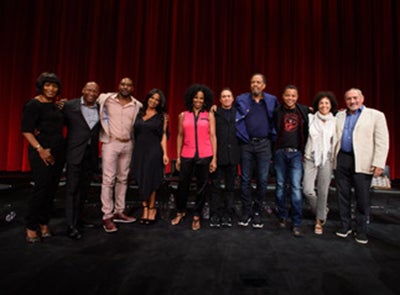
It’s been nearly 25 years since Boyz N the Hood hit the big screen and shook up things in Hollywood. John Singleton made his debut as a 23-year-old writer and director and became the first African-American to be nominated for a Best Director Oscar.
The movie also launched the acting careers of Cuba Gooding Jr., Morris Chestnut, Ice Cube and Nia Long while shining an overdue spotlight on the talents of established actors Laurence Fishburne, Angela Bassett and Tyra Ferrell.
But for those lucky enough to revisit the movie or see it for the first time, there is a sobering realization that some things haven’t changed. Police brutality and gun violence continue to claim the lives of young Black males and there is still the need to remind the world that #BlackLivesMatter.
“When you make a movie for the first time, you don’t think about how deep it is. You just want to get the work done,” said a humbled John Singleton, at the Academy of Motion Picture Arts and Sciences 25th Anniversary Celebration of Boyz N the Hood last week in Beverly Hills. “And the accolades came later … but what I think people were responding to, was that it was happening everyday and every night throughout the country.”
The Academy’s celebration included both a screening of the movie – which hit the big screen July 12, 1991 – and a star-studded panel that included Singleton, Bassett, Gooding, Long, Chestnut and Ferrell. Cultural commentator and film critic Elvis Mitchell acted as moderator.
As an added treat, the audience got to see screen tests from Ice Cube, Gooding, Long, Bassett and Ferrell and hear fascinating behind the scenes tales and recollections. For instance, the pride Ferrell feels in both the film and her part in it lives on inside of her, she said. Ferrell delivered one of Boyz N the Hood’s most unforgettable performances as Mrs. Baker, Doughboy and Ricky’s mother.
John Singleton’s Latest Project Addresses Black Officers In Regards To Police Brutality Epidemic
“It was the first time I saw a movie with myself in it where I didn’t watch myself,” a teary-eyed Ferrell said of her initial screening of the finished product. “Usually, you watch yourself and you have to go back and see the movie again. I had just left a rehearsal for White Men Can’t Jump and when I sat down, I couldn’t believe what was happening. I didn’t see myself, I didn’t watch myself and I was just totally moved. I really cried. I didn’t know what I was involved in at the time. It just blew me away. I was not Tyra. That was really a Mrs. Baker.”
Singleton commended Ferrell for her believable performance and told her, “I’ll love you forever because you accepted Doughboy’s love and then you blamed him,” referencing the film’s most heart-wrenching scene. Long, who is now a mom, also praised Ferrell for her ability to convincingly “unravel.”
Ferrell in turn thanked them adding, “I wanted to find one moment, I didn’t know if you noticed it or not, where I hugged him like I loved him,” she said. “I wanted to give him that moment because I felt love for him and then I snapped out of it. It was real for me.”
Long and Singleton went on to say Fishburne, who was not in attendance, was the father, big brother and thespian of the set, guiding everyone with words of wisdom.
The movie also rang a little too true for Long, who grew up in South Central Los Angeles and thought nothing of hearing gunshots everyday. The Love Jones actress also went to school with Lloyd Avery II, the actor who played Ricky’s shooter.
“I went to elementary school with him,” Long said. “I’m not even kidding. And he was a straight-A student who ended up going to prison and being murdered in prison. This is how close this film is to my life.
“It was very important to me as a young actress that this felt real because I knew what it was like to run home from school and hear gunshots at night doing my homework,” she added. “Meeting John and knowing that we shared many moments of growing up and living in South Central L.A. was amazing.”




